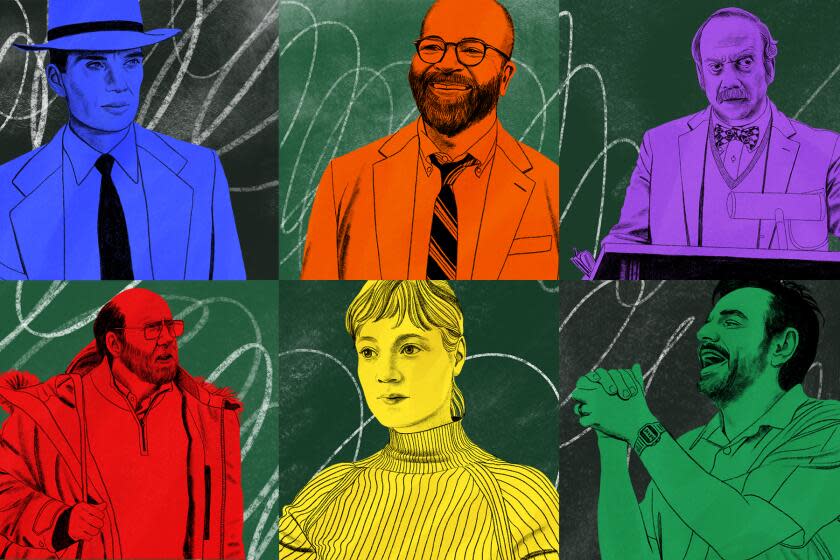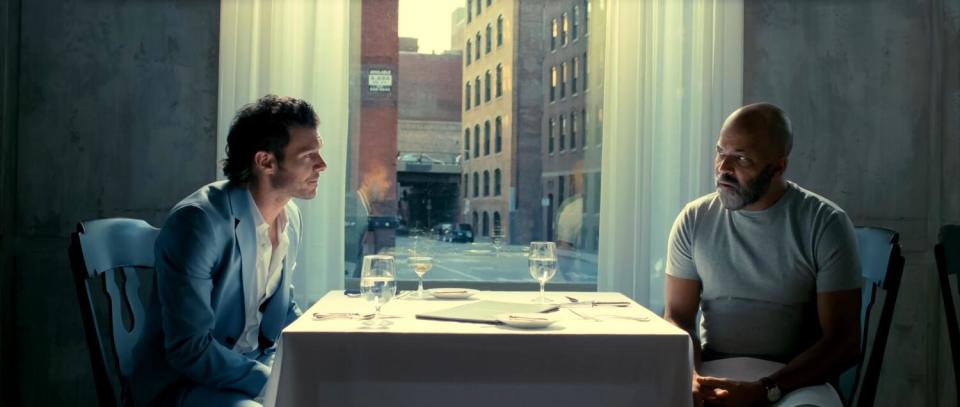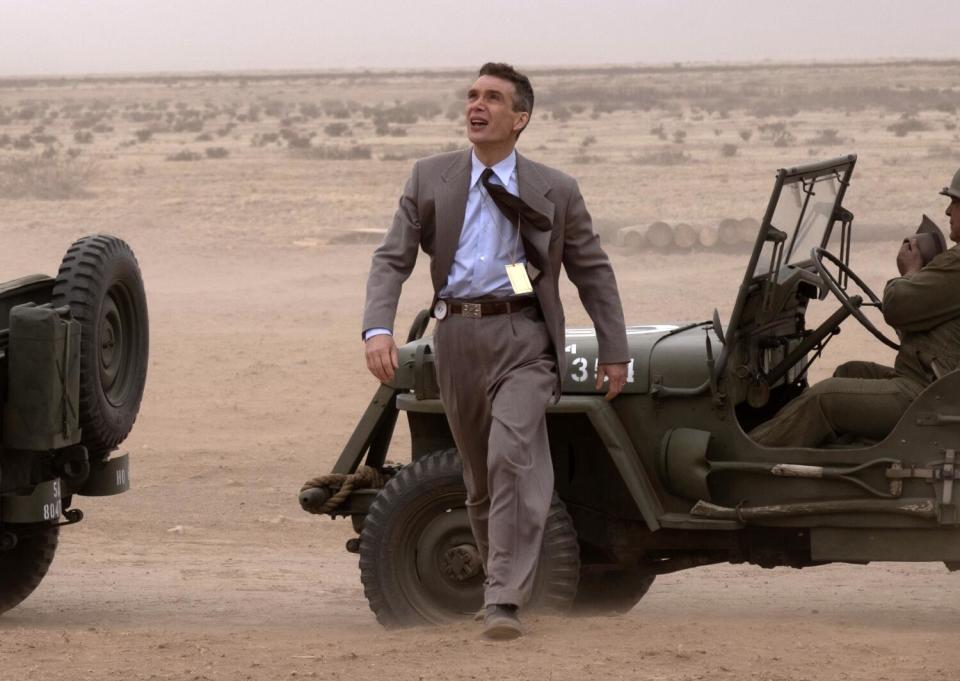Remember when teachers were inspiring, life-changing? Not so at the movies these days

Dedicated teachers are a movie — and Oscar — staple. “Dead Poets Society’s” Robin Williams; “Stand and Deliver’s” Edward James Olmos; “The Miracle Worker's" Anne Bancroft; “Mr. Holland’s Opus’” Richard Dreyfuss; “Music of the Heart’s” Meryl Streep ... these and other big-screen efforts of the past give us idealistic teachers who inspire and reach difficult students through their passion and determination. And academy voters have dutifully expressed their appreciation.
Sure, there was an occasional bad apple-receiver nominated (Richard Burton’s alcoholic, wife-fighting professor in “Who’s Afraid of Virginia Woolf?”) or even crowned (Maggie Smith’s Miss Jean Brodie, who would have been super cool if not for her unfortunate fascist sympathies). But they were the exceptions in an honored film faculty that taught viewers to carpe that diem.
In the 21st century, though, things changed. Academics either lost their minds (“A Beautiful Mind,” “Still Alice”) or acted like delinquents (“Half Nelson,” “The Lost Daughter”). Oscar went with it, which may explain why this year’s class of teacher movies is more concerned with individuals’ flaws than their knowledge-imparting skills. It could also be a reflection of the post-COVID assaults on scholarship that are roiling culture and politics. Or maybe filmmakers just want to deliver multifaceted characters rather than place them on idealized pedestals.
Here are some current contenders that show (and tell) teachers in a different light.

'American Fiction'
Jeffrey Wright’s professor Thelonious “Monk” Ellison is placed on leave for antagonizing both students and fellow faculty with his confrontational, dismissive attitude. Back home in Massachusetts, the author of underselling historical novels faces multiple crises in his well-to-do family and professional life with more intellect than emotional intelligence. Sick of how such books as “We’s Lives in Da Ghetto” do better than his finely crafted reworking of Aeschylus’ “The Persians,” Ellison decides to pull off a literary prank: He pseudonymously writes the most clichéd, pathological portrayal of African American life he can dream up.
To Ellison’s dismayed bewilderment, clueless white publishers love it and give the book a big promotional push, forcing the erudite author to pretend he’s a wanted gangsta.
Screenwriter/director Cord Jefferson’s adaptation of real USC English professor Percival Everett’s novel “Erasure” affords Emmy-winner Wright endless opportunities to highlight the intelligence he always brings to his work, as well as to play the fool. The piece’s cultural satire and complex critique of racial stereotyping take a back seat to the actor’s naturalistic, full-fleshed performance of what could have been just another prickly prof. Wright gives us that rarest portrayal of an accomplished academic: someone who’s still able to learn from their mistakes.
'The Holdovers'
Paul Hunham is a mess. He got kicked out of Harvard and the only job he’s had since is as an adjunct classics teacher at a 1970 New England prep school. Students and administrators alike hate him, and the feeling is mutual; terms Hunham describes his overprivileged charges with range from “genuine troglodytes” to “snarling Visigoths.” Plus, he smells.
It’s a perfect role for curmudgeon specialist Paul Giamatti, if not quite the pure pleasure of a loser he previously played for director Alexander Payne in “Sideways.” But Giamatti sets Hunham on a carefully trodden path toward heroic humanity when he’s forced to baby-sit his most troublesome student, newcomer Dominic Sessa’s Angus Tully, on the depopulated campus over Christmas break. Both actors keep audiences guessing if their frosty relationship will permanently thaw. And Giamatti proves a generous scene partner for Da’Vine Joy Randolph’s Mary Lamb, the school’s grieving cook and fellow holdover.
Hunham may not be as fun as the “Sideways” wine aficionado was. By the time he makes an inevitable sacrifice, though, Giamatti has turned the cranky educator into a guy worth hanging with. Even if you sometimes have to hold your nose.
'Dream Scenario'
Though he enjoys a happy family life, middle-aged biology professor Paul Matthews is frustrated by his failure to publish. When he inexplicably starts appearing in random people’s dreams, the resulting celebrity threatens to turn his head. But when those dreams evolve into nightmares, can he cope with the cruel realities of cancel culture?
In his subtlest, most challenging and finest performance since his Oscar-nominated double role in “Adaptation.” (2003), “Leaving Las Vegas” lead actor winner Nicolas Cage brings out all of Matthews’ petty resentments and yearnings while hanging by fingernails onto the character’s embattled moral compass (his resistance to Dylan Gelula’s attempt at seduction may be the funniest cringe scene of the year). Not that Cage’s signature, nutty outbursts aren’t welcome wherever he does them, but Matthews’ manic moments seem particularly well-earned, because the actor and writer-director Kristoffer Borgli construct their surreal, um, scenario from credible behavior and motivations.
And what could be more realistic than, after falling from cultural grace in America, trying to make it in France? “Dream Scenario” knows more than it lets on.
'The Teachers' Lounge'
In Germany’s international feature Oscar entry, Leonie Benesch plays Carla Nowak, a rookie middle school teacher well-regarded by her students and colleagues. Initially, anyway. Disturbed by the school’s pseudo-fascistic (in Germany; imagine that!) investigation of a string of thefts, daughter of Polish immigrants Nowak sets a trap to find the real culprit in the titular break area. The evidence yielded is not exactly ironclad, and concerns are re-focused on privacy violation. Soon ostracized by all those around her, Nowak struggles to balance compassion for everyone affected with certainty that her dubious methods have revealed the truth.
Writer-director Ilker ?atak wants to present the school as a microcosm of society’s ills, to the point where we learn little to nothing about Nowak’s private life. Yet Benesch, who won the German Film Award (called the Lola) for her performance, is so fully invested in the character’s job issues that we feel we know the teacher completely. Benesch accesses a fundamental decency that almost makes Nowak’s sneakiness forgivable.
Though no one else in the movie thinks so. And they’re probably right.
'Radical'
2023’s most traditional inspiring educator story, “Radical” offers up a characteristically antic Eugenio Derbez as Sergio Juárez Correa, the unconventional new sixth-grade teacher at Matamoros, Mexico’s worst elementary school. How bad is the underfunded, border town institution? The kids are all right, but the bullet-riddled corpses they pass en route to campus would scare away the toughest “Blackboard Jungle,” “Dangerous Minds” or “Lean on Me” instructors.
Based on a true story, this Sundance audience award-winning feature charts Sergio’s quixotic determination to let his charges learn what they want instead of rote curricula (flotation mechanics is a hot topic), battle administrative corruption and do whatever he can to help students reach their top potential. Building on his galvanizing music teacher in best picture winner “CODA,” Derbez strikes a watchable balance between his usual comic chops and Sergio’s desperation to do good. It borders on sentimental overload, but director Christopher Zalla also wisely follows three disciplined young actors — Jennifer Trejo, Danilo Guardiola and Mia Fernanda Solis — who embody the joy of learning’s true worth.

'Oppenheimer'
Really smart guys from Berkeley, Princeton and other great universities figure out a way to win World War II and kill multiple thousands. Understanding the human, political and moral implications of their research doesn’t come as easily, though their leader, J. Robert Oppenheimer (at least as played by Cillian Murphy), gains some inkling in Christopher Nolan’s intimate A-bomb epic.
“We were worried that we’d start a chain reaction that would destroy the entire world,” Murphy’s Oppie reminds Tom Conti’s Albert Einstein at the end. “I believe we did."
If a little knowledge is a dangerous thing, a lot of knowledge is, well, whatever sits beyond dangerous.
This story originally appeared in Los Angeles Times.